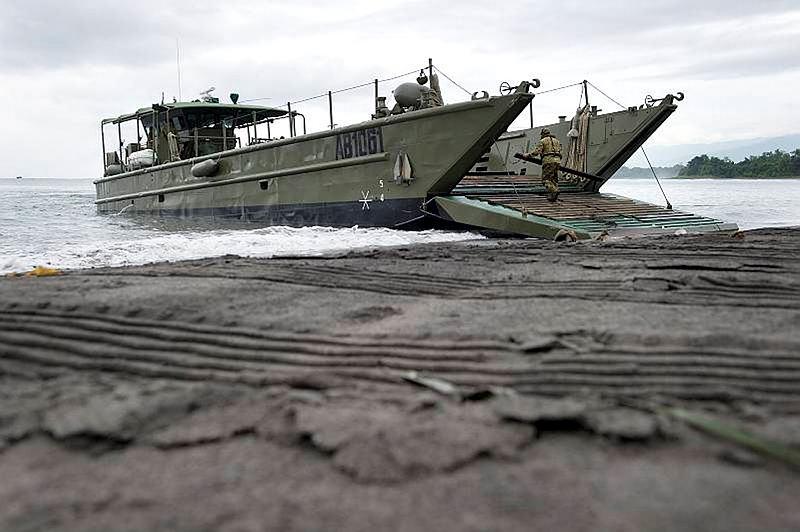Land-based strike capability: a force multiplier for the ADF?
Posted By Mark Ascough on October 28, 2014 @ 12:15
 [1]
[1]Jan Gleiman and Harry White’s latest post [2] argues that regional militaries should consider land-based anti-ship missiles within their modernisation programs. That discussion’s both timely and relevant. And, indeed, the Australian Army has recently been looking at the role that land-based capabilities could have in contributing to a discussion of Joint Archipelagic Manoeuvre [3] (PDF), thereby helping to ensure free and unfettered access to the maritime global commons. But Gleiman and White gloss over both the complexity of adopting such missile systems and the strategic implications that such a purchase could have within the region.
The authors did a good job of stating the case for the operational utility of land-based anti-shipping missiles. What they didn’t do was articulate a wider strategy which made best use of that weapon system. A basic case isn’t too hard to make. Because the geography north of Australia is archipelagic, the ADF needs a coherent vision for how it might operate in that environment. While it has been the custom to talk in terms of an ‘air-sea gap’ to the north, we really should think of the land elements as well—the ‘gap’ is actually filled with an extensive array of land masses of various sizes.
That’s where the strength of Gleiman and White’s argument lies—it links the land with the maritime environment. Being able to deny the sea from the land is a powerful capability, which in turn would help enable maritime operations, especially in the littoral. In this view, it’s not just the Air Force and Navy that operate in the ‘gap’, it’s the whole of the ADF that operates jointly in an ‘air-sea-land environment’. That’s why the Army has been thinking about the role it could play in such an approach.
But it’s not just a matter of blending weapons systems. True, capabilities such as land-based anti-ship missiles have the potential to enhance Australia’s ability to undertake both sea denial and sea control. But they require an evolution in thinking with regard to our strategic culture [4] (PDF). And we must consider what regional strategic effects would follow from the wider deployment of such missiles by others. Any change in a nation’s capability portfolio is inevitably going to alter its coercive leverage points. Our purchase of land-based anti-ship missiles could accelerate a change in the political and military landscape, especially if the systems purchased region-wide have the ability to target not just shipping but potentially to reach numerous cities within the Indo-Pacific [5] region.
There’s no doubt the development and acquisition of capabilities such as land-based maritime strike and long-range fires [6] provide land forces with the ability to generate greater combat weight, free up scarce air and maritime forces for other tasking, and—as Gleiman and White state—generate strategic flexibility. It’s those ideas that influenced the Joint Archipelagic Manoeuvre concept—and are also informing our allies’ [7] and our adversaries’ thinking. If we do head down that path in a more determined fashion, a challenge will be ensuring that the Army is adequately resourced for such a mission (something that requires not just missiles and launchers but training, education, doctrine, facilities and time) while at the same time remaining structured and resourced to carry out its principal task of winning the land battle [8] (PDF) against our adversaries.
So there are pluses and minuses here. Incorporation of the capability advocated by Gleiman and White extends beyond simply adding a weapon system to the Australian Defence Force’s arsenal. Yes, land-based anti-ship missiles could enable truly joint operations to control strategic economic maritime links [8](PDF, p57) and they have the potential to enhance significantly the military’s coercive deterrent effect. But we can’t overlook second- and third-order effects—including the possibility that they may also trigger more rapid or additional investment regionally by both state and non-state actors or alter existing political and military relationships. Those are all considerations worthy of further discussion.
Mark Ascough is an Australian Army officer. The views expressed in this paper are his own and do not reflect those of the Australian Army or Department of Defence. Image courtesy of Department of Defence [9].
Article printed from The Strategist: https://aspistrategist.ru
URL to article: /land-based-strike-capability-a-force-multiplier-for-the-adf/
URLs in this post:
[1] Image: https://aspistrategist.ru/wp-content/uploads/2014/10/20141023adf8547344_050.jpg
[2] latest post: https://aspistrategist.ru/time-to-start-thinking-about-land-based-anti-ship-missiles/
[3] Joint Archipelagic Manoeuvre: http://www.army.gov.au/~/media/Content/Our%20future/Publications/Papers/DP01_14/Discussion%20Paper%2001-14.pdf
[4] strategic culture: http://www.army.gov.au/~/media/Files/Our%20future/LWSC%20Publications/SP/sp306_Tyranny_of_Dissonance-Michael%20Evans.pdf
[5] Indo-Pacific: http://www.lowyinterpreter.org/post/2012/08/16/Indo-Pacific-Whate28099s-in-a-name.aspx
[6] long-range fires: http://www.army.gov.au/Our-future/Blog/2014/August/Deep-Fires-in-Direct-Support
[7] informing our allies’: http://breakingdefense.com/2014/10/hagel-army-role-wont-erode-can-even-broaden-to-pacific-missile-force/
[8] winning the land battle: http://www.navy.gov.au/spc/sites/default/files/publication-documents/Combined%20(web)_0.pdf
[9] Department of Defence: http://images.defence.gov.au/20141023adf8547344_050.jpg
Click here to print.